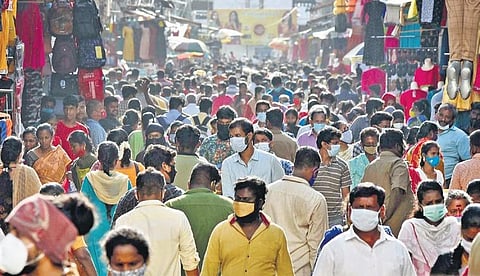

Sometimes, a move towards reform or radical demands stems from the absence of a world or the lack of an experience. Listening to the media or watching the public world of pedagogy or politics, one senses an absence of ethics. Ethics provides a different texture to these conversations and a different framework of expectations. It textures the world in a different way, adding the music of value to it. The glaring absence of ethics has become one of the stark facts of life today.
One is not invoking it merely out of nostalgia, though nostalgia as an emotion combines ethics and aesthetics. Ethics summons the storyteller in a different way and structures the demands of the narrative. It adds a different quality to the level of performativity as the exemplar invites imitation. Ethics adds poetics to the value-neutral world. The world of language creates a glossary of different expectations.
One sensed this often during the National Movement, where character-building and nation-building were coterminous activities. During the National Movement, our ideas of science often evolved as autobiographies. Science, in that sense, was not an abstract exercise, but a lived world, as Gandhi’s The Story of My Experiments with Truth or Prafulla Chandra Ray’s Life and Experiences of a Bengali Chemist proved. Character-building was the answer to corruption as exemplars showed the right way of following paradigms. This era invoked not just an epic battle between good and evil but saw the power and creativity of goodness creating the music of a more virtuous world. Somehow, with independence, goodness and ethics were devalued as one opted for the managerial worlds of development and planning. Sadly, even exercises on spirituality got reduced to management as the spiritual lost its sense of ethical metaphysics to become a mere set of techniques that emphasises on control rather than self-control. Goodness became a form of correctness, an etiquette rather than a self-conscious muscular set of moral choices. Even in Bollywood, as a myth, the good father or the good teacher disappeared before the cinematic interval because it was felt that goodness lacked the efficacy to fight evil. I remember a famous psychologist once saying: “Don’t dump good people on me, they are so boring.”
The absence of ethics is felt in numerous ways. One sees it first in the everydayness of politics where power becomes a mere bundle of choices, calculations and strategies which emphasise on the neutral and the instrumental. A politician like the Czech leader Václav Havel or a resistor like Desmond Tutu is seen as an aberration. The world seems hapless with the Modis, the Trumps, the Putins, and the Erdogan, claiming they are more like the ethical individuals who are considered a rare and disappearing species. In fact, dissenting ethicists like Sudha Bharadwaj or Stan Swamy are seen as pathological and labelled “Urban Naxals”. The illiteracy of the label is rarely questioned.
The nature of language itself has changed because ethics as a guiding force is lost. Worlds become more tactical, strategic, and managerial. One sees this today in the way we use words like ‘security’ or ‘sustainability’. They are creatures of calculation rather than an appeal to sacrifice, trusteeship and martyrdom. In fact, ethics is no longer considered a majoritarian idea but a marginal construct belonging to the defeated. When goodness becomes an embarrassment, it is time citizens wake up. Mere protest or rhetoric is inadequate; one needs a new set of experiments, interpretations and even a return to storytelling.
One has to begin with the simplicity, the poetic power of everyday pedagogy. The child has to learn that ethics is a drama he or she enacts and internalises every day. One of the great textbooks the Jesuits as pedagogues invented was the moral science textbook, with its medley of debates, anecdotes, and questions. It left issues open. One had to talk, debate and consult parents to find the answer. Ethics acquired a sense of conversation, of moral adventure and exploration. Reading these debates, one acquired the language and feel of ethics as a sense of craftsmanship. Epics, myths, and parables added to the corpus of knowledge, creating a diversity of perspectives open to experimentation and pedagogy. The child in that sense literally grew up as a moral scientist, searching for the right without yielding to righteousness. As adult professionals and citizens, we need to discuss ethics. The poor debates on security issues like AFSPA, or the ethical illiteracy of biotechnology where the genetically modified mustard issue is reduced to productivity is obvious. Topics like nuclear energy can no longer be left to experts, and issues like incest can no longer be erased through silence. Ethics cannot be subject to benign neglect. It needs the exemplar, the public presence of debate. The search for the answer rather than a sense of certainty is a crucial part of the rituals of ethics.
ALSO READ | Need new morals to confront banal violence
Issues like peace and the idea of the Anthropocene have to be opened to citizens. Ordinary language should have the power to articulate issues. Ideas like violence, defence and genocide should be questions we should confront in an everyday sense because ethics and memory weave to create character. Myth becomes an important part of life and no society should be devoid of legends and literary classics. There is relevance and an excitement to them that one has to capture. There is a sadness that we boast of the information revolution and the knowledge society without ethics. Ethics is one illiteracy that democracy must focus on now. There is an immediacy to this that demands ethical issues like Kudankulam, AFSPA, Covid, riots, etc. become a part of the democratic imagination. Only ethics can rescue democracy from majoritarianism.
The challenge is exciting and inventive, and is an invitation to a different world where drama and everydayness create a different world. Goodness is at times difficult to resist.
Shiv Visvanathan
Social scientist associated with THE COMPOST HEAP, a group researching alternative imaginations